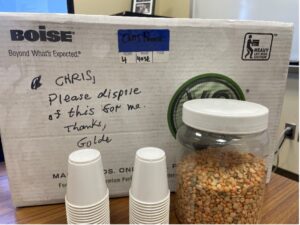How My First Statistics Professor Changed My Life—A Tribute to Golde Holtzman
Chris Franck, Associate Professor
 Golde Holtzman is an emeritus faculty member at Virginia Tech. He earned his PhD from North Carolina State University in 1980. Holtzman served as a professor in the department of statistics at Virginia Tech from 1980–2014. He retired in 2014.
Golde Holtzman is an emeritus faculty member at Virginia Tech. He earned his PhD from North Carolina State University in 1980. Holtzman served as a professor in the department of statistics at Virginia Tech from 1980–2014. He retired in 2014.I was an undergraduate psychology major in the spring of 2002 when I took Introductory Statistics from Golde Holtzman at Virginia Tech. I didn’t really know what statistics was back then, but there was a girl I liked who sometimes went to that class. So I went to class every day.
Golde was tasked with conveying essential statistical ideas to an audience of teenagers three times a week at 8 a.m. We were to learn about foundational topics, including populations, samples, the role randomization plays in achieving representative data, distributions, standardization, and a little bit about confidence intervals and hypothesis tests. The concepts were taught broadly and in a conceptual manner, perhaps because nobody there really knew any math. I remember at least one help session focused on how to handle both subtraction and division when computing ![]()
For eight weeks, the class went about as well as you would expect.
One day, in these dreary circumstances, the strangest thing happened. Golde swept into class with an empty jar, a scoop, separate collections of green and yellow beans, a few dozen Dixie cups, and some plastic spoons. He told us to mix the beans while he left the room, and he’d correctly guess the proportion of green to yellow scoops. He returned once we filled the jar, and he divided us into 20 teams.
He asked, “What’s it called if I take a spoonful of beans from the entire jar?”
From the back of the room, a voice I had never heard spoke up: “A sample.”
“What’s the entire jar called?”
Another new voice answered, “The population.”
“Should I take a sample now?”
“No.”
“Why not?”
“Shake the jar! Randomize!”
And with that, 20 teams set about sampling the now-shaken jar, reporting to Golde the proportion of green beans in their sample. He entered the data into a spreadsheet but was ultimately able to correctly guess the secret proportion with a single scratch of his beard.
The demo was plausible and yet incredible. Intuitively, the sample proportions should be close to the proportion in the jar. But it had not occurred to me that the truth in that jar could be reconstructed based on 20 tiny spoon-sized samples. Golde had lucidly demonstrated a complete microcosm of statistical reasoning. He taught us that these principles enable doctors to learn the rates of side effects of drugs, engineers to assess failure rates of their work, and others to obtain actionable intel more generally in any setting where data could be collected.
On that day, I quit all other professional aspirations to focus on doing whatever I could to grasp the entirety of what I had just witnessed.
In the aftermath of that experience, I switched my major to statistics. I survived calculus well enough to go to graduate school at North Carolina State University. I got my PhD in 2010 and came back to the Virginia Tech Department of Statistics as a faculty member, surprised to learn my first statistics hero had an office two doors down from mine.
In 2014, I told this story at Golde’s retirement party. Shortly thereafter, I found a box outside my office with a note that read, “Chris, please dispose of this for me. Thanks, Golde.” Inside the box was a big jar of faded green and yellow beans and a few dozen Dixie cups.
Chris Franck is an associate professor in the department of statistics at Virginia Tech.



















Great story! Thanks for demonstrating the power of good statistics professors to inspire and motivate.
Leave your response!